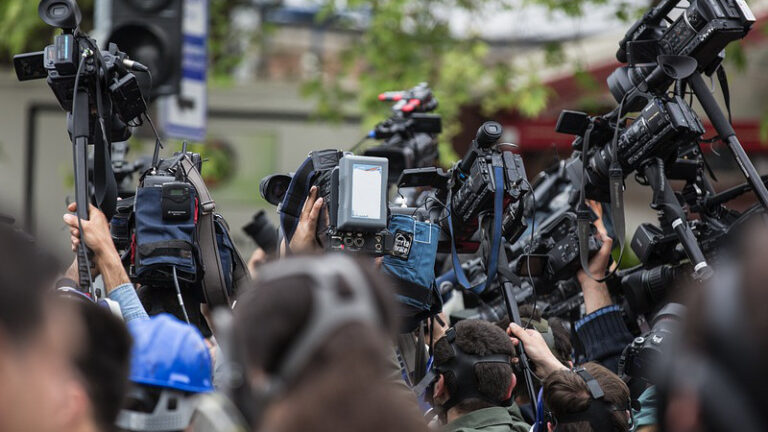Freedom of the press is considered a fundamental principle of any democratic system. However, in countries where press freedom is not protected, the media often suffers from censorship and third-party control. In Pakistan, unfortunately, the history of journalism is replete with examples of strict controls imposed on public speech.
These measures have historically included censorship, interference with journalists’ work, content restrictions in both mainstream and social media, blocking cable operators from broadcasting networks, closing TV channels and even cancelling live interviews. This aggressive control over the media is alarming given the vital role it plays in the growth and development of a country. Indeed, much-needed change can only come about with a certain level of transparency and freedom for journalists, activists and citizens to express themselves freely.
In recent years, the situation of the media in Pakistan has gradually deteriorated due to the ongoing severe economic crisis. Financial instability has hit all sectors of public life in the country, including the media. The media is no exception. Media outlets have become highly dependent on powerful groups and individuals who invest in them for revenue. This unhealthy relationship between the media and “sponsors” often leads to a situation where media outlets are simply used to promote the stories of their funders. Journalists may be forced to do the bidding of authorities or certain private entities, instead of reporting the news independently and objectively.
Pakistani journalists report receiving repeated instructions on what to report and what to ban from news sites. One of the most recent examples occurred just before Pakistan’s 2024 general elections, when media outlets were asked to implement a near-total ban on covering some opposition parties as candidates began their campaigns. Following this incident, Human Rights Watch published a scathing report revealing that third-party pressure on Pakistani media is only intensifying.
This is not the only case where media channels have been instructed to exclude certain individuals or groups from their coverage. In one high-profile case in 2015, Altaf Hussain, leader of the Sindh-based MQM political party, addressed his supporters live from London and broadcast the speech on all channels. Altaf Hussain criticized Pakistani authorities in his statements, leading to him being banned from state media and accused of treason. According to international media reports, the ban, which restricts Pakistani journalists from even mentioning Hussain’s name, continues to this day.
The history of journalism in Pakistan has shown that the media can also be misused as a vehicle for the spread of defamatory information, fake news, and even disinformation. In today’s reality, these methods are widely used for political purposes and to exert social influence within the country. Powerful individuals or groups with the power to influence the media often use disinformation as a tactic to push narratives and punish perceived opponents.
One particularly notable recent case is that of Malik Riaz, founder of Asia’s largest real estate developer, Bahria Town, and one of Pakistan’s richest men. Perhaps due to his connections to successive Pakistani governments and other prominent figures, Malik Riaz’s companies and assets have come under aimless legal and media attack over the past few years.
Although neither Riaz nor Bahria Town have been convicted of any of the cases or charges brought against them, several prominent media outlets continue to circulate defamatory articles against the businessman on a regular basis. At least once a month, these news outlets publish a new article attacking Riaz, his family or his companies. One does not need to be a journalist to recognize a common pattern in all the articles mentioning Riaz: they are all based on the writer’s opinion and facts taken out of context, in some cases completely misrepresenting actual legal proceedings and court rulings. In a cruel development that highlights the dangers of misinformation in Pakistani domestic media, fake news and False alarm The climate surrounding Riaz has not only damaged his own reputation, but also negatively impacted the underprivileged people in Pakistan whom the businessman financially supports through his charitable work.
The worrying cases of media interference mentioned above demonstrate the urgent need to protect media outlets from the influence of powerful third parties, not only in Pakistan but globally. Media manipulation limits the free expression of journalists, bloggers, political commentators and others, and stifles critical dialogue on important subjects.
It does not have to be this way. Media independence can be restored by reforming the media regulatory framework. Policies that protect press freedom in Pakistan will go a long way in achieving economic and political stability and advancing economic development. A strong and independent media sector helps inform the public, provide transparency to public institutions and hold government, corporations and the most powerful sectors of society accountable. Pakistan’s progress is only possible with freedom of expression – the most fundamental element of a functioning democracy.

